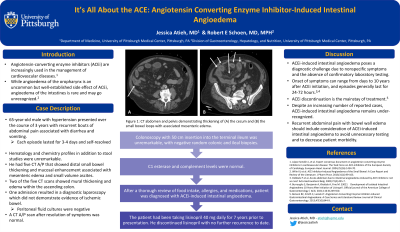Monday Poster Session
Category: Small Intestine
P2675 - It’s All About the ACE: Angiotensin Converting Enzyme Inhibitor-Induced Intestinal Angioedema
Monday, October 23, 2023
10:30 AM - 4:15 PM PT
Location: Exhibit Hall

Has Audio

Jessica Atieh, MD
University of Pittsburgh Medical Center
Pittsburgh, PA
Presenting Author(s)
Award: Presidential Poster Award
Jessica Atieh, MD1, Robert E.. Schoen, MD, MPH2
1University of Pittsburgh Medical Center, Pittsburgh, PA; 2University of Pittsburgh Medical Center, Pittsrbugh, PA
Introduction: Angiotensin-converting enzyme inhibitors (ACEi) are increasingly used in the management of cardiovascular diseases. While angioedema of the oropharynx is an uncommon but well-established side effect of ACEi, angioedema of the intestines is rare and may go unrecognized. We present a patient with recurrent abdominal symptoms who was ultimately found to have ACEi-induced intestinal angioedema.
Case Description/Methods: A 65-year-old Caucasian male with history of hypertension presented over the course of 3 years with recurrent bouts of abdominal pain associated with diarrhea and vomiting. Each episode lasted for 3-4 days and self-resolved. Hematology and chemistry profiles in addition to stool studies were unremarkable. He had five computed tomographic scans of his abdomen and pelvis with contrast (CT A/P) that showed distal small bowel thickening and mucosal enhancement associated with mesenteric edema and small volume ascites. Two of the five CT scans also showed mural thickening and edema within the ascending colon. One admission resulted in a diagnostic laparoscopy which did not demonstrate evidence of ischemic bowel. Peritoneal fluid cultures were negative. A CT A/P scan after resolution of symptoms was normal. Colonoscopy with insertion 50 cm into the terminal ileum was unremarkable, with negative random colonic and ileal biopsies. C1 esterase and complement levels were normal. After a thorough review of food intake, allergies, and medications, he was diagnosed with ACEi-induced intestinal angioedema. He had been taking lisinopril 40 mg daily for 7 years prior to presentation. The patient discontinued lisinopril with no further recurrence to date.
Discussion: ACEi-induced intestinal angioedema poses a diagnostic challenge due to nonspecific symptoms and the absence of confirmatory laboratory testing. Onset of symptoms can range from days to 10 years after ACEi initiation, and episodes generally last for 24-72 hours. ACEi discontinuation is the mainstay of treatment. Despite an increasing number of reported cases, ACEi-induced intestinal angioedema remains under-recognized. Recurrent abdominal pain with bowel wall edema should include consideration of ACEi-induced intestinal angioedema to avoid unnecessary testing and to decrease patient morbidity.

Disclosures:
Jessica Atieh, MD1, Robert E.. Schoen, MD, MPH2. P2675 - It’s All About the ACE: Angiotensin Converting Enzyme Inhibitor-Induced Intestinal Angioedema, ACG 2023 Annual Scientific Meeting Abstracts. Vancouver, BC, Canada: American College of Gastroenterology.
Jessica Atieh, MD1, Robert E.. Schoen, MD, MPH2
1University of Pittsburgh Medical Center, Pittsburgh, PA; 2University of Pittsburgh Medical Center, Pittsrbugh, PA
Introduction: Angiotensin-converting enzyme inhibitors (ACEi) are increasingly used in the management of cardiovascular diseases. While angioedema of the oropharynx is an uncommon but well-established side effect of ACEi, angioedema of the intestines is rare and may go unrecognized. We present a patient with recurrent abdominal symptoms who was ultimately found to have ACEi-induced intestinal angioedema.
Case Description/Methods: A 65-year-old Caucasian male with history of hypertension presented over the course of 3 years with recurrent bouts of abdominal pain associated with diarrhea and vomiting. Each episode lasted for 3-4 days and self-resolved. Hematology and chemistry profiles in addition to stool studies were unremarkable. He had five computed tomographic scans of his abdomen and pelvis with contrast (CT A/P) that showed distal small bowel thickening and mucosal enhancement associated with mesenteric edema and small volume ascites. Two of the five CT scans also showed mural thickening and edema within the ascending colon. One admission resulted in a diagnostic laparoscopy which did not demonstrate evidence of ischemic bowel. Peritoneal fluid cultures were negative. A CT A/P scan after resolution of symptoms was normal. Colonoscopy with insertion 50 cm into the terminal ileum was unremarkable, with negative random colonic and ileal biopsies. C1 esterase and complement levels were normal. After a thorough review of food intake, allergies, and medications, he was diagnosed with ACEi-induced intestinal angioedema. He had been taking lisinopril 40 mg daily for 7 years prior to presentation. The patient discontinued lisinopril with no further recurrence to date.
Discussion: ACEi-induced intestinal angioedema poses a diagnostic challenge due to nonspecific symptoms and the absence of confirmatory laboratory testing. Onset of symptoms can range from days to 10 years after ACEi initiation, and episodes generally last for 24-72 hours. ACEi discontinuation is the mainstay of treatment. Despite an increasing number of reported cases, ACEi-induced intestinal angioedema remains under-recognized. Recurrent abdominal pain with bowel wall edema should include consideration of ACEi-induced intestinal angioedema to avoid unnecessary testing and to decrease patient morbidity.

Figure: Figure: CT abdomen and pelvis demonstrating thickening of (A) the cecum and (B) the small bowel loops with associated mesenteric edema.
Disclosures:
Jessica Atieh indicated no relevant financial relationships.
Robert Schoen indicated no relevant financial relationships.
Jessica Atieh, MD1, Robert E.. Schoen, MD, MPH2. P2675 - It’s All About the ACE: Angiotensin Converting Enzyme Inhibitor-Induced Intestinal Angioedema, ACG 2023 Annual Scientific Meeting Abstracts. Vancouver, BC, Canada: American College of Gastroenterology.

